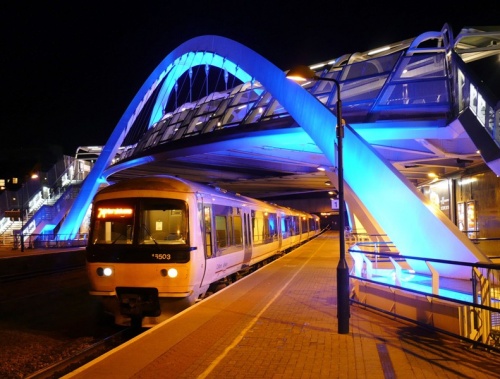Difference between revisions of "White Horse Bridge"
| Line 28: | Line 28: | ||
<references/> | <references/> | ||
| − | [[Category:Case studies | + | [[Category:Case studies – Bridges]] |
Revision as of 12:00, 12 March 2019
This state-of-the-art 50m long footbridge spans railway lines at Wembley Stadium station, and provides a crucial link from the new National Stadium to Wembley town centre. The bridge is named after Billy, a white police horse, who famously cleared the pitch of 1000s of fans allowing the first cup final to take place in 1923.
The 50m long steel composite deck is 25m wide and is supported by hangers from four steel arches, two vertical and two inclined. The arch elements are a triangular box shape fabricated from steel plates ranging from 40mm to 80mm thick. The steel grades specified are listed below, and Z35 material to EN 10164[1] was also required in certain locations to guarantee through thickness ductility.
- S355J2 to EN 10025-2[2] for plates up to 50mm thick.
- S355K2 to EN 10025-2[2] for plates 55mm to 70mm thick.
- S355NL to EN 10025-3[3] for plates over 70mm thick.
Each arch section weighing up to 130t was lifted in a single piece using a 1200t capacity crane. In total, 820t of structural steelwork was erected in two 29hr weekend rail possessions over a two-week period.
| Architect | Marks Barfield Architects |
| Structural Engineer | Halcrow |
| Steelwork Contractor | Cleveland Bridge UK Ltd. |
| Main Contractor | Edmund Nuttall Ltd. |
| Client | London Development Agency |
References
- ↑ BS EN 10164: 2004, Steel products with improved deformation properties perpendicular to the surface of the product - technical delivery conditions. BSI
- ↑ 2.0 2.1 BS EN 10025-2: 2004, Hot rolled products of structural steels, Part 2: Technical delivery conditions for non-alloy structural steels, BSI
- ↑ BS EN 10025-3: 2004, Hot rolled products of structural steels, Part 3: Technical delivery conditions for normalized / normalized rolled weldable fine grain structural steels, BSI




